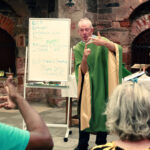(RNS) — When French intellectual Alexis de Tocqueville toured the United States in the early 19th century, he was struck by how religious Americans were. He linked that religiosity with the success of our young democracy, observing that “religion is the first of the political institutions in that country,” for “it facilitates the use of liberty.” Religion, he argued, provided a moral foundation – a lingua franca – that allowed liberty to flourish.
Two centuries after de Tocqueville’s visit, the American experiment has entered a new chapter. The biggest story in American religion in the last three decades is the increasing number of Americans who report they have no religious affiliation, commonly called “nones.” According to the General Social Survey, nones made up 5% of the country in 1991. By 2022, they comprised nearly one-third of the adult population. Over the same period, the share of people who said they never attend religious services rose from 12% to 33%. We are just beginning to see how these changes will affect our democracy.
In the wake of this seismic shift in the religious landscape, countless commentators have argued that many nones are replacing traditional practices like church attendance and prayer with spiritual alternatives such as yoga, meditation, astrology or even spin classes. The implication is that while 100 million Americans have abandoned organized religion, they are still people of faith, so de Tocqueville’s thesis still holds.
But in spite of the ubiquity of the phrase, “I’m spiritual but not religious,” our research has found that most American nones have not replaced religion with alternative spiritual practices. Through a grant from the John Templeton Foundation, we conducted a survey of over 12,000 Americans who identify as atheist, agnostic or nothing-in-particular to determine just how spiritual they are and what types of spiritual activities they engage in.
We found nonreligious Americans report being significantly less spiritual than people who identify with established traditions such as Christianity, Judaism or Islam. Among religious respondents, 62% said spirituality was “very important” to them compared with only 24% of nones. In contrast, 27% of the nonreligious said spirituality was “not at all important,” while just 4% of religious respondents said the same. In short, the religious are far more likely to report a deep well of spirituality than the nones.
That point was reinforced when we asked respondents to check boxes next to spiritual activities they engaged in over the prior month. Whether it be yoga, meditation, astrology, crystals or saging their home, we found no instance where nones were more likely to engage in an alternative spiritual practice than the religious control group in our sample. In fact, we found that 55% of nonreligious respondents selected none of eight possible spiritual activities. That’s a huge group of nones – over 50 million Americans – who don’t have a regular spiritual practice of any sort, our research shows.
Our data shows that 27% of nones said they practiced meditation in the last few weeks, and 15% had done yoga or astrology during the same time period. And the survey data reveals that while a lot of attention has been paid to alternative practices like using crystals and ingesting psychedelics for enlightenment, real engagement in those areas is actually rare: Less than 10% of nones engaged in either of those practices.
The conclusion that emerges from our survey is that a growing number of Americans who have walked away from churches, mosques and synagogues have not used their newfound freedom from religion to seek out new spiritual practices. In essence, they have traded religion for nothing at all.
But they don’t seem to be worse for it. For many religious Americans, there is a deeply held conviction that those who are neither religious nor spiritual must be living unsatisfied, meaningless lives. But our survey data strongly challenges that assumption. Among Protestants, 48% report being very satisfied with life — only slightly higher than the 46% among respondents who expressed no inclination toward religion or spirituality.
These results challenge assumptions about the future of American religious institutions. If nearly half of the nonreligious report high life satisfaction, the belief that faith is the only path to fulfillment becomes harder to defend. This raises difficult questions for religious leaders and believers. Tens of millions of Americans center their entire worldview on the conviction that an encounter with the divine gives life meaning and purpose. But when these true believers try to convince their friends and neighbors to join them in this way of thinking, they are met with little more than a shrug of the shoulders.
But this seismic shift in American life will change our democracy. Our research reveals a philosophical divide between people for whom faith is at the very heart of life and those who hardly think about it at all. And as Americans no longer share the lingua franca of religion — a widely held set of beliefs and a common language to articulate them — it becomes incumbent on our political and cultural leaders to find other areas of commonality to stabilize our democracy and reinforce our liberty before we sink further into polarization.
(Ryan Burge, an associate professor of political science at Eastern Illinois University, is research director for Faith Counts and the author, most recently, of “The American Religious Landscape: Facts, Trends, and the Future.” Tony Jones, a theologian and outdoorsman, is the author of “The God of Wild Places.” They co-direct the Making Meaning in a Post-Religious America Project. The views expressed in this commentary do not necessarily reflect those of RNS.)



